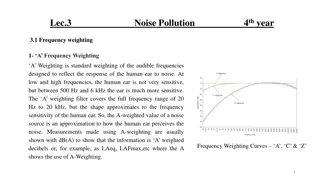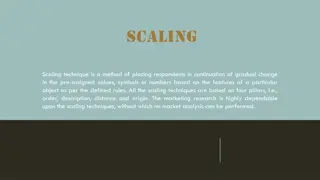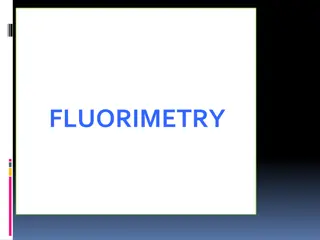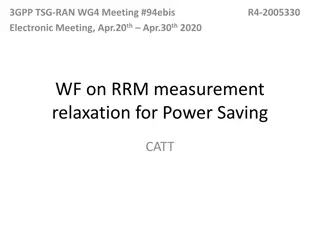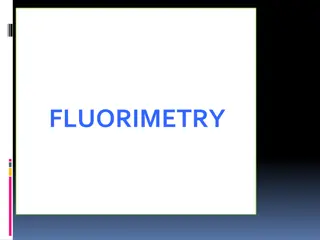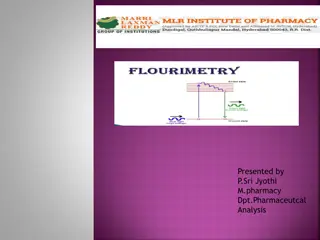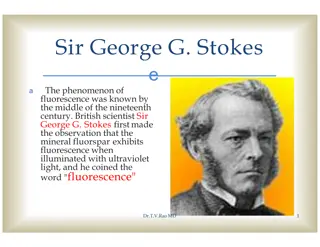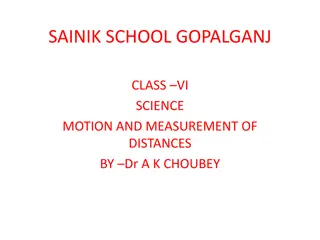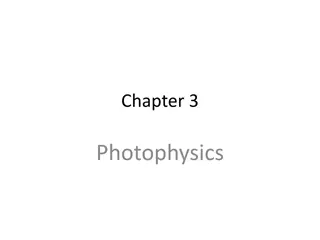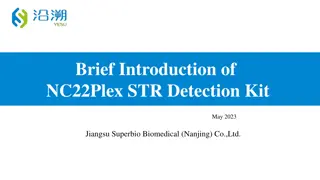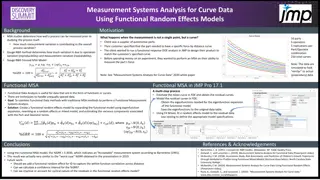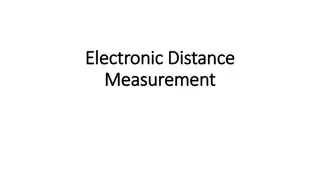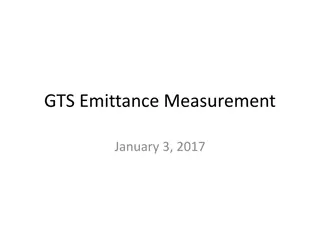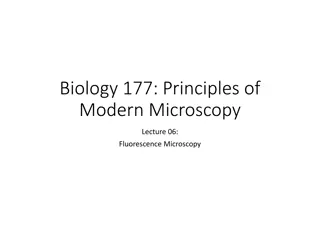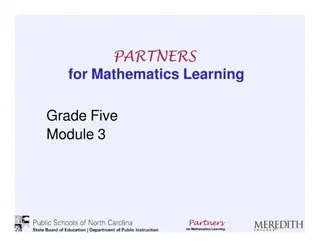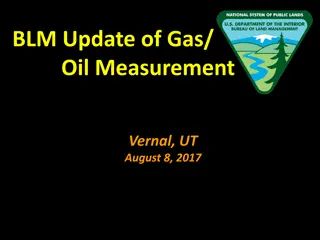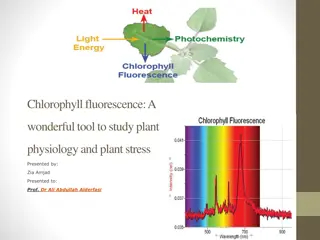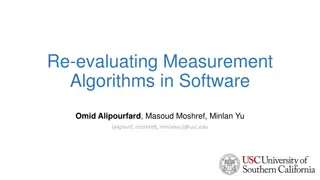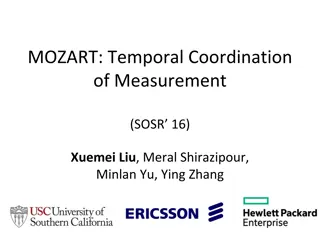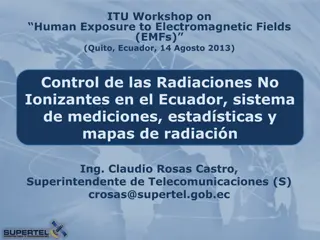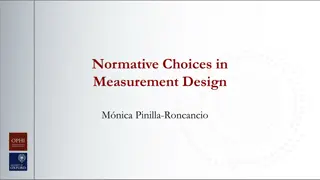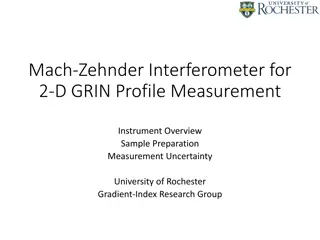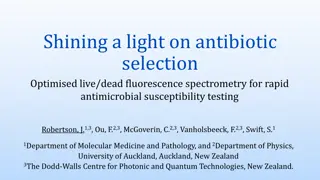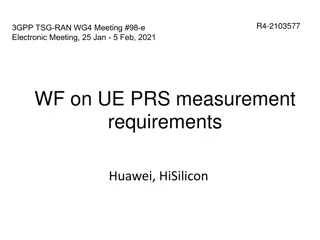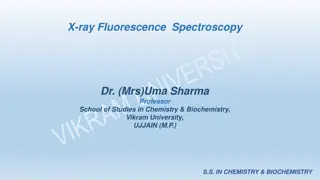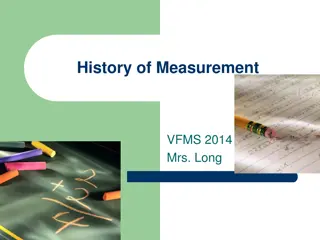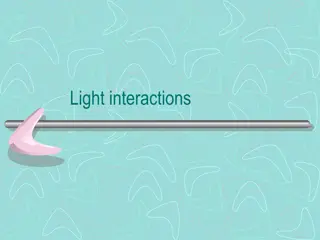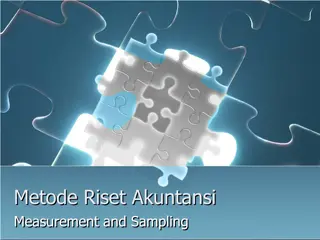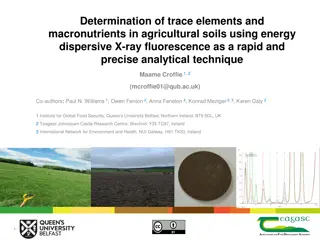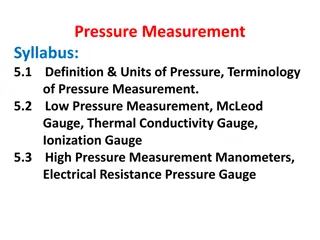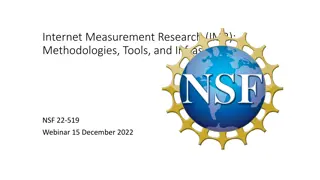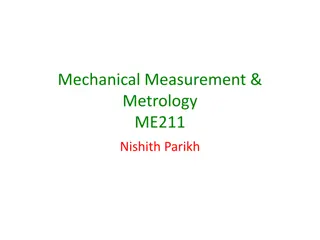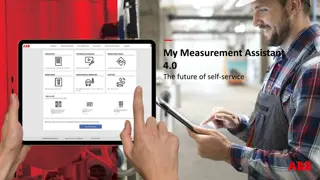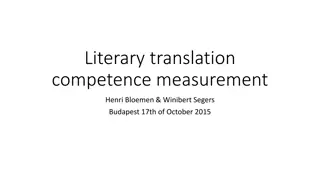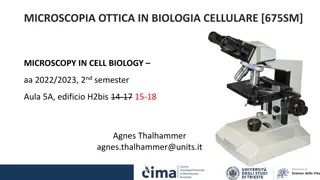Understanding Frequency Weighting in Noise Pollution Measurement
Frequency weighting is essential in noise pollution measurement to reflect how the human ear perceives noise. The A, C, and Z weightings are commonly used to represent different frequency responses. A-weighting covers the audible frequencies where the human ear is most sensitive, while C-weighting i
2 views • 7 slides
Verification Environment for ALTIROC3 ASIC in ATLAS High Granularity Timing Detector
The verification environment for the ALTIROC3 ASIC in the ATLAS High Granularity Timing Detector is crucial for the upgrades in the ATLAS HL-LHC experiment, aiming to improve particle detection performance in the forward region, mitigate pile-up effects, and provide luminosity measurement. The ALTIR
7 views • 26 slides
Advanced Microscopy Techniques and Applications in Cell Biology
Explore the diverse world of advanced microscopy techniques in cell biology, from confocal and super-resolution imaging to Fluorescence Resonance Energy Transfer (FRET) microscopy and Fluorescence Recovery After Photobleaching. Discover the latest methods, considerations, and applications for studyi
3 views • 21 slides
Understanding Measurement Scales and Scaling Techniques
Measurement scales play a crucial role in marketing research, with techniques like scaling helping to categorize data. The content discusses four types of measurement scales: nominal, ordinal, interval, and ratio, outlining their characteristics and differences. Scaling techniques involve placing re
5 views • 7 slides
Understanding Fluorimetry: Principles and Applications
Fluorimetry is the measurement of fluorescence intensity at a specific wavelength using instruments like filter fluorimeters. It involves the excitation of molecules by radiation, causing electron promotion and emission of radiation. This process includes states like singlet and triplet, with relaxa
3 views • 45 slides
RRM Measurement Relaxation for UE Power Saving in 3GPP Meeting #94ebis
This document discusses methods for relaxing RRM measurements to save power in UE devices during idle/inactive states. It covers scenarios with low mobility, non-cell edge, and combinations, suggesting options like longer measurement intervals and relaxing neighbor cell measurement requirements. The
0 views • 7 slides
Understanding Fluorimetry: Principles, Applications, and Instrumentation
Fluorimetry is a technique that measures fluorescence intensity of molecules when excited by radiation. It involves the promotion of electrons from ground to excited states, leading to emission of radiation. This process includes singlet and triplet states, as well as relaxation mechanisms like Coll
0 views • 45 slides
Understanding Fluorescence Analysis in Pharmaceutical Sciences
Fluorescence analysis is a crucial technique in pharmaceutical analysis, involving the emission of radiation by molecules when excited at specific wavelengths. Factors influencing fluorescence, such as concentration, light intensity, adsorption, oxygen presence, pH, temperature, viscosity, and photo
2 views • 26 slides
Understanding Fluorescence Microscopy: Principles and Applications
Fluorescence microscopy, pioneered by British scientist Sir George G. Stokes, reveals hidden details in specimens using fluorescent dyes that emit light of longer wavelengths. This innovative technique allows for visualization of cellular components that are otherwise colorless under conventional mi
0 views • 19 slides
Understanding Motion and Measurement of Distances in Science at Sainik School Gopalganj
Explore the concepts of motion and measurement of distances in science as taught by Dr. A.K. Choubey at Sainik School Gopalganj. Discover the development of means of transport, different measurement methods like non-standard and standard measures, the significance of measurement, and the Internation
1 views • 16 slides
Exploring the Fascinating World of Photophysics and Luminescence
Dive into the intriguing realm of photophysics, where various emission and loss processes lead to luminescence phenomena such as fluorescence, phosphorescence, and chemiluminescence. Discover the beauty of bioluminescence in nature, from fireflies to bioluminescent red tide events. Explore the mecha
0 views • 16 slides
NC22Plex STR Detection Kit: Advanced 5-Color Fluorescence Detection System
Explore the cutting-edge NC22Plex STR Detection Kit from Jiangsu Superbio Biomedical, offering a 5-color fluorescence detection system suitable for multiple applications. Enhance your research capabilities with this innovative product designed for precision and efficiency.
0 views • 20 slides
Functional Measurement Systems Analysis for Curve Data Using Random Effects Models
Measurement Systems Analysis (MSA) is crucial in determining the contribution of measurement variation to overall process variation. When dealing with curve data instead of single points, a Functional MSA approach using random effects models can be applied. This involves estimating mean curves, mode
0 views • 5 slides
Understanding Electronic Distance Measurement in Surveying
Electronic Distance Measurement (EDM) is a precise method for measuring distances between two points using electromagnetic waves. It offers speed and accuracy, especially useful for long or inaccessible distances. EDM, a type of surveying instrument, measures phase changes in energy waves traveling
0 views • 7 slides
Understanding Measurement and Instruments in Research
Exploring the significance of instruments in research, this content delves into the development and utilization of measures for concepts like caring. It covers the various devices used to measure constructs, the rules governing measurement assignment, direct versus indirect measurement methods, and
2 views • 64 slides
Emittance Measurement Techniques and Analysis
Various emittance measurement techniques like Solenoid and Viewscreen, Single Slit and Viewscreen are discussed in this document along with details on the measurement process, equipment setup, and data analysis methods. Emittance calculations, beamlet intensity profiles, and space-charge dominated b
0 views • 11 slides
Exploring Fluorescence Microscopy and High-Speed Cameras in Modern Biology
Delve into the fascinating world of fluorescence microscopy and high-speed cameras in biology through topics such as detectors for microscopy, Nyquist criterion, visualizing hearing in vivo, and temporal resolution insights. Learn about techniques, equipment, and practical considerations in utilizin
1 views • 69 slides
Exploring Measurement Challenges and Concepts in Grade Five Mathematics
Delve into a variety of measurement challenges in Grade Five mathematics, including different units, common errors, measurement components, big ideas, accuracy, precision, and the measurement process. Understand the nuances between accuracy and precision, factors affecting measurement accuracy, and
0 views • 39 slides
Update on Gas and Oil Measurement Rules in Vernal, UT
New rules for gas and oil measurement were implemented in Vernal, UT on August 8, 2017. These rules focus on site security, facility measurement points, recordkeeping, and incorporating industry standards. The regulations aim to approve new measurement technology, update standards, and address gaps
1 views • 87 slides
Understanding Chlorophyll Fluorescence in Plant Physiology
Chlorophyll fluorescence is a powerful tool developed in the 1990s for studying plant physiology and stress. It provides insights into photosynthetic processes at different levels, from subcellular to canopy. By measuring chlorophyll fluorescence, researchers can assess the efficiency of photosynthe
0 views • 16 slides
Understanding Energy and Power: A Comprehensive Guide
Explore the concepts of energy, power, and electricity consumption, including definitions, equations, units of measurement, and examples. Learn about watts, kilowatt-hours, and how lighting impacts residential energy usage. Discover how different light bulbs work and their efficiency. Delve into the
0 views • 22 slides
Re-evaluating Measurement Algorithms in Software Domain
This content explores the importance of measurement algorithms in software, focusing on network function virtualization (NFVs) and software switches. It discusses the critical role of measurement in decision-making for firewall, load balancing, and intrusion detection systems in managing NFVs. The n
0 views • 22 slides
Temporal Coordination of Measurement in Data Centers
Measurement plays a crucial role in data centers for fault diagnosis, traffic engineering, and attack detection. This study focuses on the concept of temporal coordination of measurement to overcome issues like reporting overhead and resource wastage. Various examples illustrate the importance of co
0 views • 29 slides
Regulation and Measurement Process of Non-Ionizing Radiation Exposure in Ecuador
This content discusses the regulation and measurement methods for non-ionizing radiation exposure in Ecuador, including maximum exposure limits, measurement procedures, and information dissemination to the public. It covers topics such as international recommendations, measurement techniques, data p
0 views • 30 slides
Choices in Measurement Design and National Poverty Assessment
This content discusses normative choices in measurement design, normative reasoning, relevance, usability, essential choices for creating an Alternative Poverty Measure (AF Measure), alongside measurement design considerations, and a purpose statement for a National MPI. It emphasizes the importance
0 views • 33 slides
Mach-Zehnder Interferometer for 2-D GRIN Profile Measurement
Mach-Zehnder Interferometer is a powerful tool used by the University of Rochester Gradient-Index Research Group for measuring 2-D Gradient-Index (GRIN) profiles. This instrument covers a wavelength range of 0.355 to 12 µm with high measurement accuracy. The sample preparation involves thin, parall
0 views • 6 slides
Understanding Television Research: Markets, Measurement, and Methodologies
Explore the world of television research through topics such as television markets, measurement approaches, local measurement services like Nielsen and Comscore, and Nielsen's measurement methodologies. Learn about Designated Market Areas (DMAs), Household Demographics, People Meters, Portable Peopl
0 views • 42 slides
Optimised Live/Dead Fluorescence Spectrometry for Antimicrobial Susceptibility Testing
This study focuses on the optimisation of live/dead fluorescence spectrometry for rapid antimicrobial susceptibility testing. The research uses fluorescent dyes to distinguish between live and dead cells, providing a potential method for quick antimicrobial resistance diagnostics. The experiment inv
0 views • 16 slides
UE PRS Measurement Requirements Discussion at 3GPP TSG-RAN WG4 Meeting #98-e
Discussion at the 3GPP TSG-RAN WG4 Meeting #98-e focused on UE PRS measurement requirements. The topics included consideration of muting in measurement periods, periodicity scaling for PRS resources, handling different resource periodicities, and offsets in measurement periods. Various options were
0 views • 18 slides
Applications and Importance of X-ray Fluorescence Spectroscopy in Analytical Chemistry
X-ray Fluorescence Spectroscopy (XRF) is a vital analytical technique used for qualitative and quantitative analysis of elements based on their X-ray emission characteristics. Dr. Uma Sharma, a Professor at Vikram University, details various X-ray analytical methods, including X-ray emission, Auger
0 views • 21 slides
Evolution of Measurement Systems Over Time
Explore the fascinating journey of measurement systems from historical units like cubit and fathom to the modern metric system. Discover how civilizations developed standardized units for length, weight, and mass. Follow the timeline of measurement advancements, from King Edward's iron ulna to the b
0 views • 36 slides
Understanding Light Interactions: Reflection, Absorption, and Fluorescence
Explore the fascinating world of light interactions, where light can be reflected, absorbed, or transmitted based on the nature of the object it encounters. Learn about absorption in different materials, fluorescence, phosphorescence, and the concepts of specular and diffuse reflection.
0 views • 17 slides
Understanding Accounting Research Methods: Measurement and Sampling
Measurement is a crucial aspect of research in accounting. It involves assigning numbers to empirical events, objects, or properties. Measurement consists of selecting measurable phenomena, developing mapping rules, and applying these rules appropriately. The process of measurement includes determin
0 views • 63 slides
Rapid Analysis of Soil Macronutrients Using Energy Dispersive X-ray Fluorescence
Determination of trace elements and macronutrients in agricultural soils is crucial for crop productivity. This study highlights the advantages, challenges, and objectives of using energy dispersive X-ray fluorescence for rapid and precise analysis. The method requires minimal sample preparation, co
0 views • 10 slides
Comprehensive Guide to Pressure Measurement Methods
This comprehensive guide delves into the definition, units, and terminology of pressure measurement, covering low and high-pressure measurement techniques such as McLeod Gauge, Thermal Conductivity Gauge, Ionization Gauge, Manometers, and Electrical Resistance Pressure Gauge. It also explores the re
0 views • 56 slides
Advancing Internet Measurement Research: IMR Program Overview
The Internet Measurement Research (IMR) program aims to enhance Internet measurement methodologies, tools, and infrastructure for a comprehensive understanding of wired and wireless networks. It promotes the development of new data collection methods, measurement tools, and related infrastructure. T
0 views • 23 slides
Mechanical Measurement & Metrology ME211 Teaching Scheme and Syllabus
Teaching scheme includes lectures and labs schedule, continuous examination plan, evaluation criteria, internal assessment, and syllabus covering measurement concepts, linear and angular measurement, gear terminology, measurement of mechanical parameters, and miscellaneous metrology topics. Recommen
0 views • 18 slides
My Measurement Assistant 4.0 - The Future of Self-Service
My Measurement Assistant 4.0 is a cutting-edge self-service application designed to enhance customer experience and support for ABB measurement devices. It offers a wide range of features such as spare parts identification, error code identification, temperature performance estimation, and remote su
1 views • 34 slides
Understanding Competence Measurement in Literary Translation
Exploring the concept of competence measurement in literary translation, this text delves into the ELV competence model, a five-step scheme for measurement, reliability versus validity, and the relationship between competence measurement and translation product evaluation. It discusses the importanc
0 views • 18 slides
Microscopic Techniques in Cell Biology: Lessons and Labs Overview
Explore the fascinating world of optical microscopy in cellular biology, covering topics such as image formation, contrasting techniques, fluorescence microscopy, live-imaging techniques, and quantitative microscopy. Dive into the principles behind various microscopy techniques and experimental labs
0 views • 7 slides
